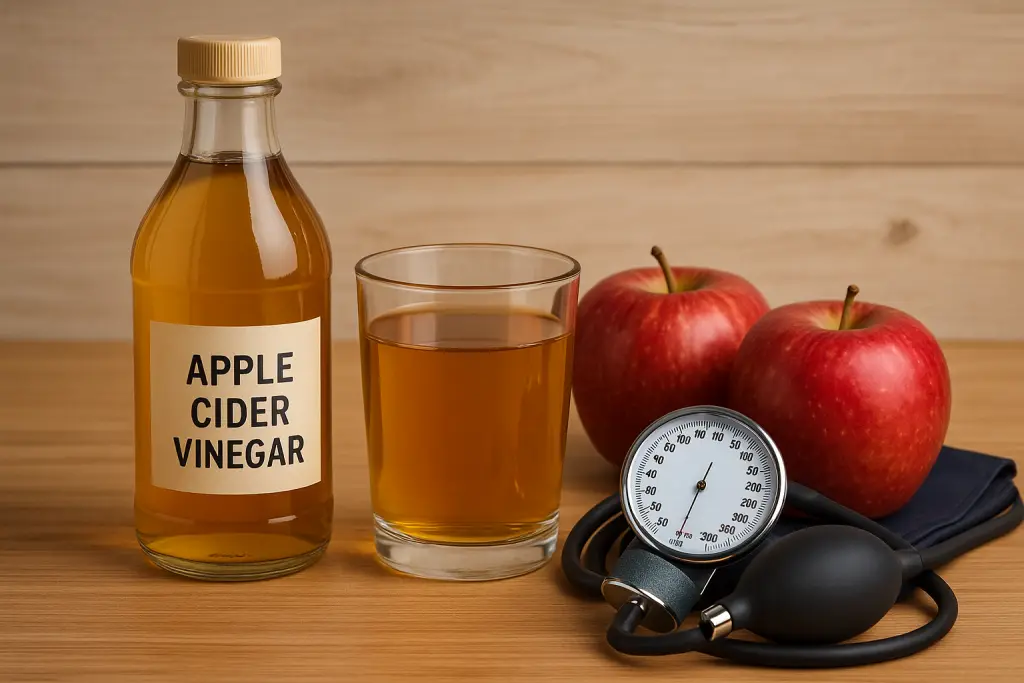Apple cider vinegar and high blood pressure are often discussed together in the wellness world. Many people believe that apple cider vinegar (ACV) can naturally reduce blood pressure and support heart health. But how much of this is fact, and how much is fiction? This article explores the evidence behind apple cider vinegar and its potential role in managing hypertension.
Understanding High Blood Pressure
High blood pressure, or hypertension, is a chronic condition where blood force against the artery walls remains consistently high. Left unmanaged, it increases the risk of heart disease, stroke, and kidney problems. Effective blood pressure management usually involves lifestyle changes, medication, and regular monitoring.
Apple Cider Vinegar and Blood Pressure: The Claims
- Potassium content: ACV contains small amounts of potassium, a mineral that supports healthy blood vessel function. However, the potassium levels in vinegar are much lower than in potassium-rich foods like bananas or leafy greens.
- Acetic acid: The main active compound in ACV is acetic acid, which has been studied for possible benefits on blood vessel health. Some animal studies suggest it may help lower blood pressure, but evidence in humans remains limited.
What Does the Research Say?
When it comes to apple cider vinegar and high blood pressure, scientific evidence is still developing:
- Human studies: Few well-designed clinical trials directly test the effects of ACV on hypertension. Most available research focuses on weight loss, blood sugar, and cholesterol rather than blood pressure.
- Animal studies: Some animal research indicates that acetic acid might lower blood pressure. However, results from animal models don’t always apply to humans.
- Individual variation: People may respond differently to ACV depending on their diet, genetics, and whether they are taking blood pressure medication.
Safety and Considerations
If you’re considering ACV for blood pressure, keep these precautions in mind:
- Dilution: Always dilute ACV with water to prevent damage to tooth enamel and throat irritation.
- Medication interactions: ACV may interact with diuretics, insulin, and certain heart medications. Consult your doctor before use.
- Not a replacement: ACV should not replace prescribed treatments. It may serve as a complementary approach alongside proven lifestyle and medical therapies.
Final Thoughts
While apple cider vinegar has many potential health benefits, the link between apple cider vinegar and high blood pressure is not yet strongly supported by science. At best, ACV may provide mild benefits due to its acetic acid and small potassium content, but more research is needed. If you have hypertension, it’s essential to follow a comprehensive management plan that includes healthy eating, regular exercise, stress management, and prescribed medications when necessary.
FAQ: Apple Cider Vinegar and High Blood Pressure
Can apple cider vinegar lower high blood pressure?
Some animal studies suggest that acetic acid in apple cider vinegar may help reduce blood pressure, but strong human evidence is lacking. It should not be used as a replacement for medical treatment.
How should I take apple cider vinegar if I have high blood pressure?
Always dilute ACV in water before drinking. Start with 1–2 teaspoons mixed in a large glass of water. Never consume it undiluted, as it can damage teeth and irritate the throat.
Does apple cider vinegar interact with blood pressure medications?
Yes. Apple cider vinegar may interact with diuretics, insulin, and digoxin. Speak with your healthcare provider before using it if you are on medication for hypertension.

